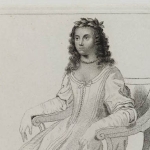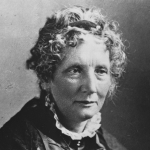Of Chesterton, In the County of Huntingdon, Esquire
How blessed is he, who leads a Country life,
Unvex’d with anxious Cares, and void of Strife!
Who studying peace, and shunning Civil Rage,
Enjoy’d his Youth, and now enjoys his Age:
All who deserve his love, he makes his own;
And, to be lov’d himself, needs only to be known.
Just, Good, and Wise, contending Neighbours come
From your Award to wait their final Doom;
And, Foes before, return in Friendship home.
Without their Cost, you terminate the Cause;
And save th’ Expence of long Litigious Laws:
Where Suits are travers’d; and so little won,
That he who conquers, is but last undone:
Such are not your Decrees; but so design’d,
The Sanction leaves a lasting Peace behind;
Like your own Soul, Serene; a Pattern of your Mind.
Promoting Concord, and composing Strife,
Lord of your self, uncumber’d with a Wife;
Where, for a Year, a Month, perhaps a night,
Long Penitence succeeds a short Delight:
Minds are so hardly match’d, that ev’n the first,
Though pair’d by Heav’n, in Paradise, were curs’d.
For Man and Woman, though in one they grow,
Yet, first or last, return again to Two.
He to God’s Image, She to His was made;
So, farther from the Fount, the Stream at random stray’d.
How cou’d He stand, when, put to double Pain,
He must a Weaker than himself sustain!
Each might have stood perhaps; but each alone;
Two Wrestlers help to pull each other down.
Not that my Verse wou’d blemish all the Fair;
But yet, if some be Bad, ‘tis Wisdom to beware;
And better shun the Bait, than struggle in the Snare.
Thus have you shunn’d, and shun the married State,
Trusting as little as you can to fate.
No porter guards the Passage of your Door;
T’ admit the Wealthy, and exclude the Poor:
For god, who gave the Riches, gave the Heart
To sanctifie the Whole, by giving Part:
Heav’n, who foresaw the Will, the Means has wrought,
And to the Second son, a Blessing brought:
The First-begotten had his Father’s Share,
But you, like Jacob, are Rebecca’s Heir.
So may your Stores, and fruitful Fields increase;
And ever be you bless’d, who live to bless.
As Ceres sow’d where e’er her Chariot flew;
As Heav’n in Desarts rain’d the Bread of Dew,
So free to Many, to Relations most,
You feed with Manna your own Israel-Host.
With Crowds attended of your ancient Race,
You seek the Champian-Sports, or Sylvan-Chace:
With well-breath’d Beagles, you surround the Wood,
Ev’n then, industrious of the Common Good:
And often have you brought the wily Fox
To suffer for the Firstlings of the Flocks;
Chas’d ev’n amid the Folds; and made to bleed,
Like Felons, where they did the murd’rous Deed.
This fiery Game, your active Youth maintain’d:
Not yet, by years extinguish’d, though restrain’d:
You season still with Sports your serious Hours;
For Age but tastes of Pleasures, Youth devours.
The Hare, in Pastures or in Plains is found,
Emblem of Humane Life, who runs the Round;
And, after all his wand’ring Ways are done,
His Circle fills, and ends where he begun,
Just as the Setting meets the Rising sun.
Thus Princes ease their Cares: But happier he,
Who seeks not Pleasure thro’ Necessity,
Than such as once on slipp’ry Thrones were plac’d;
And chasing, sigh to think themselves are chas’d.
So liv’d our Sires, e’er Doctors learn’d to kill,
And multiply’d with theirs, the Weekly Bill:
The first Physicians by Debauch were made:
Excess began, and Sloth sustains the Trade.
Pity the gen’rous Kind their Cares bestow
To search forbidden Truths; (a Sin to know:)
To which, if Humane Science cou’d attain,
The Doom of death, pronounc’d by God, were vain.
In vain the Leech wou’d interpose Delay;
Fatefastensfirst, and vindicates the Prey.
What Help from Arts Endeavours can we have!
Guibbons but guesses, nor is sure to save:
But Maurus sweeps whole Parishes, and Peoples ev’ry Grave,
And no more Mercy to Mankind will use,
Than when he robb’d and murder’d Maro’s Muse.
Wou’dst thou be soon dispatch’d, and perish whole?
trust Maurus with thy Life, and M-lb-rne with thy Soul.
By Chace our long-liv’d Fathers earned their food;
Toil strung the Nerves, and purifi’d the blood:
But we, their Sons, a pamper’d Race of Men,
Are dwindl’d down to threescore Years and ten.
Better to hunt in Fields, for Health unbought,
Than fee the Doctor for a nauseous Draught.
The Wise, for Cure, on Exercise depend;
God never made his work, for Man to mend.
The Tree of Knowledge, one in Eden plac’d,
Was easie found, but was forbid the Taste:
O, had our Grandsire walk’d without his Wife,
He first had sought the better Plant of Life!
Physicians for the Tree have found the Bark
They, lab’ring for Relief of Humane Kind,
With sharpen’d sight some Remedies may find;
Th’ Apothecary-Train is wholly blind.
From Files, a Random-Recipe they take,
And Many Deaths of One Prescription make.
Garth, gen’rous as his Muse, prescribes and gives;
The Shop-man sells; and by Destruction lives:
Ungrateful Tribe! who, like the Viper’s Brood,
From Med’cine issuing, suck their Mother’s Blood!
Let These obey; and let the Learn’d prescribe;
That Men may die, without a double Bribe:
Let Them, but under their Superiours, kill;
When Doctors first have sign’d the bloody Bill:
He scapes the best, who nature to repair,
Draws Phisick from the Fields, in Draughts of Vital Air.
You hoard not Health, for your own private use,
But on the Publick spend the rich Produce.
When, often urg’d, unwilling to be Great,
Your Country calls you from your lov’d Retreat,
And sends to Senates, charg’d with Common Care,
Which none more shuns; and none can better bear.
Where cou’d they find another form’d so fit,
To poise, with solid Sense, a spritely Wit!
Were these both wanting, (as they both abound)
Where cou’d so firm Integrity be found?
Well-born and Wealthy; wanting no Support,
You steer betwixt the Country and the Court:
Nor gratifie whate’er the Great desire,
Nor grudging give, what Publick Needs require.
Part must be left, a Fund when Foes invade;
And Part employ’d to roll the Watry Trade;
Ev’n Canaans happy Land, when worn with Toil,
Requir’d a Sabbath-Year, to mend the meagre Soil.
Good senators, (and such are you so give,
That Kings may be supply’d, the People thrive;
And He, when Want requires, is truly Wise,
Who slights not Foreign Aids nor over-buys;
But, on our Native Strength, in time of need, relies.
Munster was bought, we boast not the success;
Who fights for Gain, for greater, makes his Peace.
Our Foes, compell’d by Need have Peace embrac’d:
The Peace both Parties want, is like to last:
Which, if secure, securely we may trade;
Or, not secure, shou’d never have been made.
Safe in our selves, while on our selves we stand,
The sea is ours, and that defends the Land.
Be, then, the Naval Stores the Nations Care,
New Ships to build, and batter’d to repair.
Observe the war in ev’ry Annual Course;
What has been done, was done with British Force.
Namur Subdu’d, is England’s Palm alone;
The Rest Besieged; but we Constrain’d the Town:
We saw th’ Event that follow’d our Success;
France, though pretending Arms, pursu’d the Peace:
Oblig’d, by one sole Treaty, to restore
What Twenty Years of War had won before.
Enough for Europe has our Albion fought:
Let us enjoy the Peace our Blood has bought.
When once the Persian King was put to Flight,
The weary Macedons refus’d to fight:
Themselves their own Mortality confess’d;
And left the son of Jove, to quarrel for the rest.
Ev’n Victors are by Victories undone;
Thus Hannibal, with Foreign Laurels won,
To Carthage was recall’d, too late to keep his own.
While sore of Battel, while our Wounds are green,
Why shou’d we tempt the doubtful Dye agen?
In Wars renew’d, uncertain of success,
Sure of a Share, as Umpires of the Peace.
A Patriot, both the King and Country serves;
Prerogative, and Privilege preserves:
Of Each, our Laws the certain Limit show;
One must not ebb, not t’ other overflow:
Betwixt the Prince and Parliament we stand;
The Barriers of the State on either Hand:
May neither overflow, for then they drown the Land.
When both are full, they feed our bless’d Abode;
Like those, that water’d once, the Paradise of God.
Some Overpoise of Sway, by Turns they share;
In Peace the People, and the Prince in War:
Consuls of mod’rate Pow’r in Calms were made;
When the Gauls came, one sole Dictator sway’d.
Patriots, in Peace, assert the Peoples Right,
With noble Stubbornness resisting Might:
No Lawless Mandates from the Court receive,
Nor lend by Force; but in a Body give.
Such was your gen’rous Grandsire; free to grant
In Parliaments, that weigh’d their Prince’s Want:
But so tenacious of the Common Cause,
As not to lend the King against his Laws.
And, in a lothsom Dungeon doom’d to lie,
In Bonds retain’d his Birthright Liberty,
And shamed Oppression, till it set him free.
O true Descendent of a Patriot Line,
Who, while thou shar’st their Lustre, lend’st ‘em thine,
Vouchsafe this Picture of thy Soul to see;
Tis so far Good as it resembles thee:
The Beauties to th’ Original I owe;
Which, when I miss, my own Defects I show,
Nor think the Kindred-Muses thy Disgrace;
A poet is not born in ev’ry Race.
Two of a house, few Ages can afford;
One of perform, another to record.
Praise-worthy Actions are by thee embrac’d;
And ‘tis my Praise, to make thy Praises last.
For ev’n when Death dissolves our Humane Frame,
The Soul returns to Heav’n, from whence it came;
Earth keeps the Body, Verse preserves the Fame.



















Comment form: